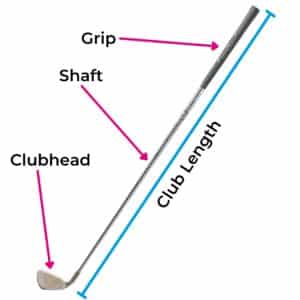Understanding the Essentials
Introducing your child to the world of golf involves navigating through countless terms and equipment types, and at the forefront is the fundamental question: What is a junior golf club? And what is the difference between adult’s and children’s clubs? In this post we aim to unravel the intricacies of junior golf clubs, shedding light on their purpose, components, and the crucial role they play in nurturing young golf enthusiasts. By the end you’ll have a thorough understanding of what makes a junior golf club unique and how to choose the right golf club for your child!
Understanding the Basics
Junior golf clubs are specially designed golf equipment tailored to the unique needs and physical characteristics of young players. These clubs are crafted with the goal of facilitating proper swing mechanics and ensuring comfort. By providing them with the optimum set, not only will they swing with confidence, but they’re love for the game will develop from an early age.
Understanding the anatomy of a junior golf club is key to making an informed decision when selecting the right set for your young golfer. So, what components make up a junior’s club?
- Shaft: The shaft is the long, slender part of the club that connects the grip to the clubhead. Junior golf clubs often feature lightweight shafts, typically made of materials like graphite, to accommodate the strength and swing speed of young players.
- Grip: The grip is the part of the club that the player holds. Junior golf clubs come with smaller grips suited to the hands of young players, promoting proper hand positioning and control. Some sets may also have colour coded grips to assist in teaching correct hand placement.
- Clubhead: The clubhead is the business end of the golf club, impacting factors like distance, accuracy, and forgiveness. Junior clubheads are designed with a larger sweet spot to make it easier for young golfers to connect with the ball consistently. Resulting in the ball flying higher and going further.
- Club Length: Junior golf clubs vary in length based on the age group they are designed for. Shorter clubs ensure that young players can maintain a comfortable and balanced stance while promoting a natural and effective swing.
Junior golf clubs are typically categorised into age groups. The common age categories include 3-5 years, 6-8 years, 9-12 years, and 13-16 years. However, at Kondor Kidz, we believe in an approach of fitting clubs based upon height rather than age as we know every child is different and develops at different speeds.
When choosing the right junior golf club, be sure to consider the following:
- Height and Reach: Your child’s height is the most important factor to consider when chossing kids clubs. Clubs that match your young golfer’s height ensure a comfortable playing experience, making the clubhead sit on the floor as it was designed. Try and avoid buying clubs based on age as after all, not all children and teens of the same age are the same height!
- Explore the Club’s Flexibility: Junior golf clubs come with varying levels of flexibility. Younger players often benefit from more flexible shafts, allowing for a smoother and forgiving swing. Matching the flexibility to your child’s playing style contributes to their overall comfort and performance. At Kondor Kidz, we partner with Lynx and Golfway who both provide a gradual shaft development from set to set, meaning as the sets get larger, the shafts get stiffer and less flexible.
- Evaluate the Club’s Weight: The weight of junior golf clubs is designed to match the strength and coordination levels of young players. A well-balanced club prevents fatigue and promotes a fluid swing. Paying attention to the weight of the clubs ensures they are suitable for your child’s physical development. Again, with both Lynx and Golfway the club weight increase gradually in line with the height increase making for well-balanced, well suited clubs.
To get fit for your perfect junior set of golf clubs, please check out our club fitting tool.
What are the Key Differences Between Adult and Junior Golf Clubs?
It’s crucial to note that junior golf clubs differ significantly from their adult counterparts. One of the most noticeable distinctions lies in the size. Junior golf clubs are scaled down to accommodate the smaller stature of young players, ensuring that the length, weight, and overall dimensions are proportionate to their developing bodies. Additionally, junior clubs often incorporate more forgiving clubheads with larger sweet spots, recognising that young golfers are still perfecting their precision and consistency. The shafts of junior clubs are typically more flexible to match the slower swing speeds of younger players, promoting a smoother and more controlled swing. These design differences collectively contribute to a junior golf club’s suitability for the unique needs and skill levels of young golf enthusiasts.
When it comes to purchasing junior golf clubs, consider exploring specialised golf stores or consulting with knowledgeable professionals. These experts can provide personalised advice based on your child’s specific needs and preferences, ensuring that the chosen set aligns seamlessly with their budding golfing journey. Beware, cheaper sets will have a negative effect on your junior golfers game. This is mostly due to the quality of materials used being lesser, resulting in heavier and less balanced clubs.
In conclusion, demystifying junior golf clubs involves understanding their components, the role each part plays, and how they cater to the unique needs of young players. Investing in the right equipment today lays the foundation for a lifelong love of the sport. If you have any further questions please reach out to one of the team who will be happy to assist. Contact us by phoning 03301 336 624, emailing us on info@kondorkidz.co.uk or send us a message on our social channels.